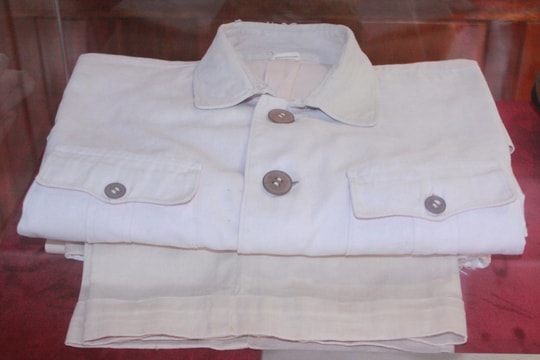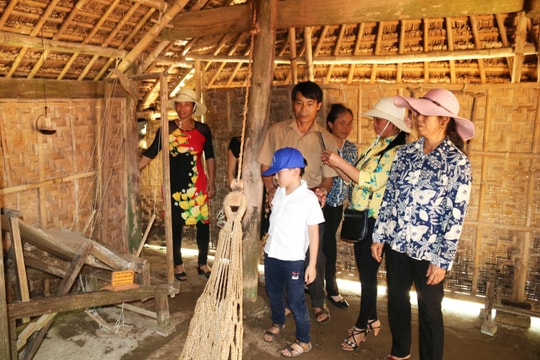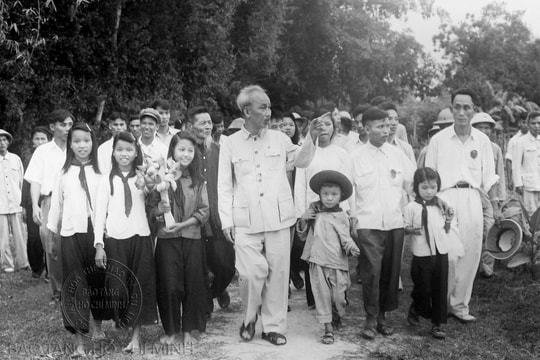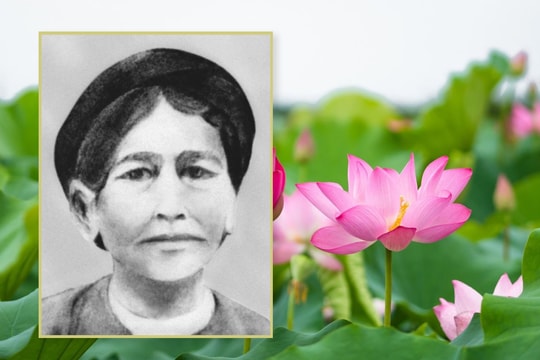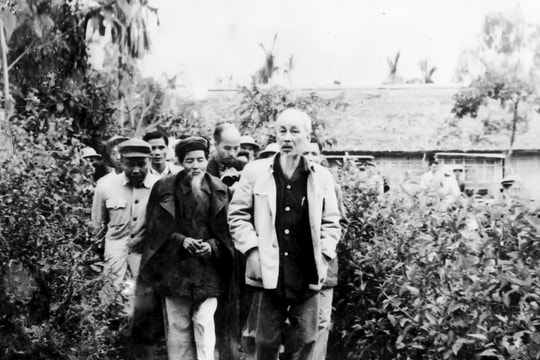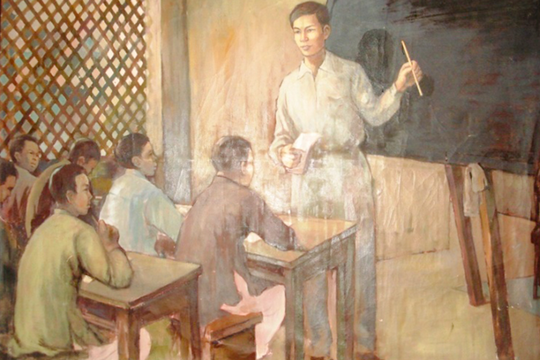Nguyen Sinh Cung and his brother followed their parents across the thousand-mile road to the capital.
The ancient capital of Hue is the place that nurtured President Ho Chi Minh's childhood during the years when he and his family traveled thousands of miles to live, study and participate in patriotic activities. This place also contributed to the formation of President Ho Chi Minh's patriotic ideology, which in turn urged him to leave home to find a way to save the country.
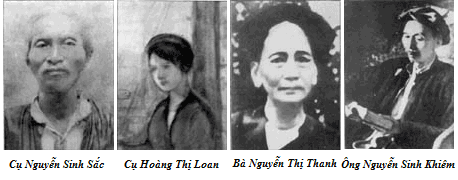
The "thousand-mile" road from Vinh to Hue at that time was still a small, narrow, winding, dangerous dirt road, through forests, over mountain passes, and was interrupted in many places by rivers, requiring ferry crossings.
Going by boat was the fastest way to cross the sea, but it cost a lot of money. On the dirt road to Hue, state officials and their wives and children had porters to serve them. They were carried on stretchers. As for ordinary people like Mr. Cu Sac's family, the only way was to "walk". They formed groups to help each other along the way, in case of illness or unfortunate encounter with robbers and wild animals. The most worrying were the seemingly endless hot sand dunes of Quang Binh and Quang Tri; many of them were about 10km long, and one had to walk all day, only leaving the sand dunes at dusk.
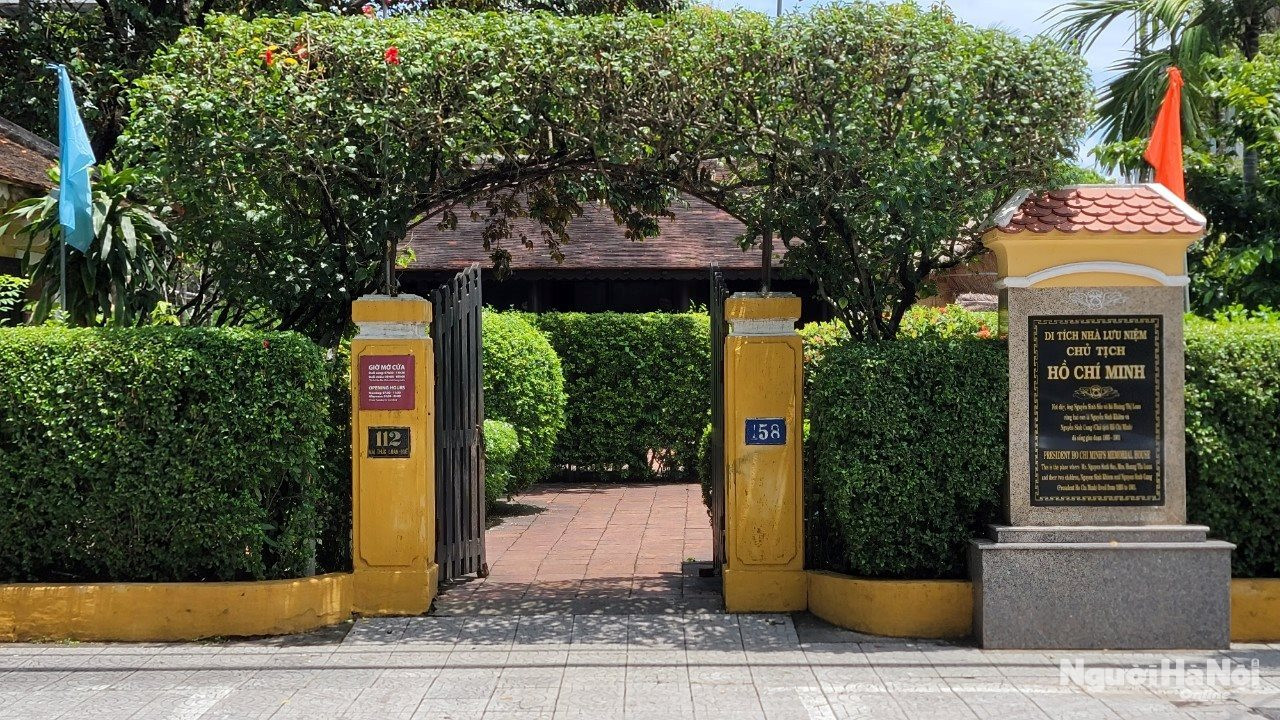
At both ends of each sand dune, there was usually a small stall selling sandals made of areca palm or cowhide leather to protect pedestrians from the scorching heat. The sandals could only be used during the day, and after passing the sand dune, people would leave them in piles. Traveling long distances was so arduous that at that time, the two words “traveling to the capital” for the people of Nghe An contained many hardships, worries, and fears.
On the first day, not used to traveling long distances, Mrs. Loan had to struggle to keep up with the group. Little Cung trotted after Brother Khiem, but after only a short distance, his legs were tired, so he had to let his father carry him. While traveling, Nguyen Sinh Cung and his brothers listened to interesting stories from their parents and saw many new and strange scenes. From Vinh to Hue, the mountains were rolling, the mountains were green and the water was blue; from the mountains and forests to the sand dunes, from the sand dunes to the ferry... Just like that, one day, two days, three days..., ten days... The journey was nearly 400 km long, and it took more than half a month to get there.
As soon as he arrived at the capital, although he was still exhausted, Mr. Cu Sac had to immediately arrange accommodation for the four people. With the help of an acquaintance, he borrowed a room from a long-abandoned military camp in the citadel. Although the room was cramped, it had enough space for Mrs. Loan to set up a weaving loom and for the three father and children to study.
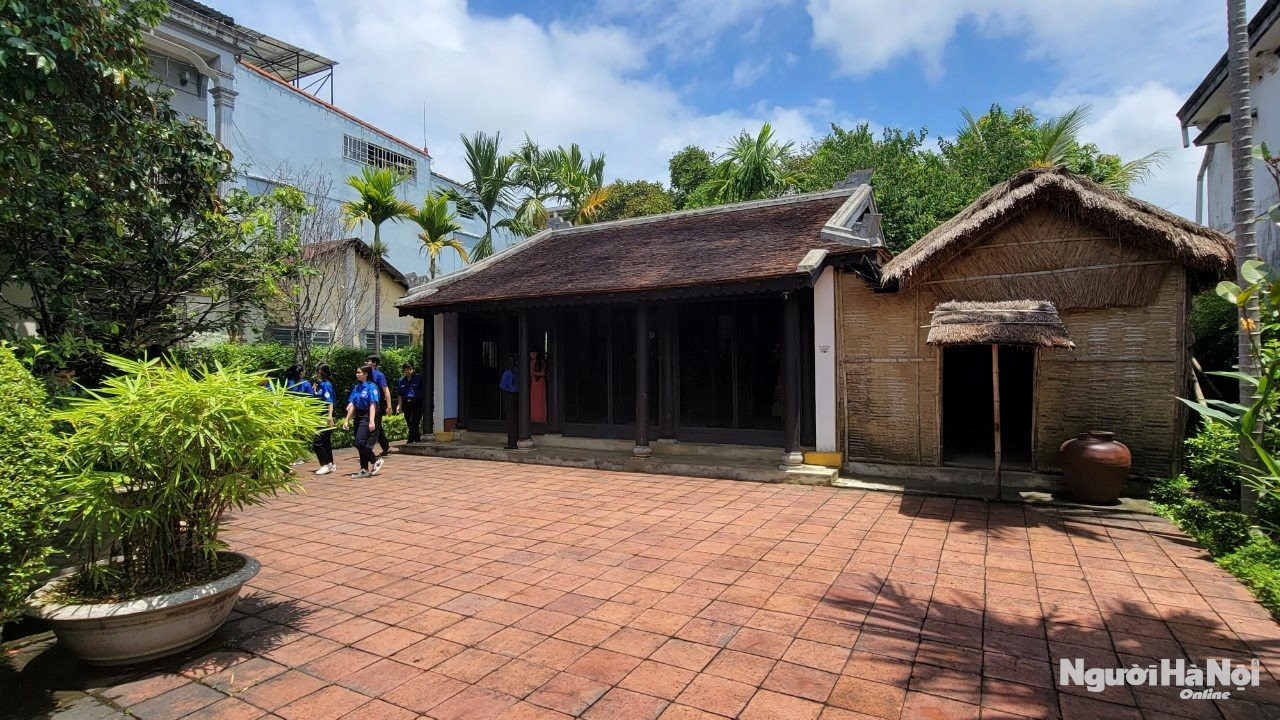
Being admitted to the Imperial Academy was a great achievement because not everyone could easily get in. To make up for the small allowance from the school for her husband, Mrs. Loan had to work hard day and night to weave and had to find a market for her products, fearing that the fabric she wove could not compare with the fabric from the capital.
Every month, Mr. Nguyen Sinh Sac only went to school a few times to “study”, and on the first day of the lunar calendar, he attended “literature review”. The rest of the time, he studied by himself and taught his two children. He also taught the children of mandarins, and wrote calligraphy for the lazy young masters who needed to write. He had very beautiful handwriting, everyone liked it.
In the first days, not yet accustomed to the scenery and people, the sadness of missing their grandmother, aunt, and sister was clearly shown on the children's faces. Mrs. Loan comforted her children, but she herself could not hold back her tears, because since she was a child, she had never been away from her mother for a day!
Brother Khiem coaxed his younger brother by taking him along the road to see strange sights. There were soldiers carrying guns standing at the city gate, wearing tiny lotus leaf hats and their feet wrapped in cloth (leggings). And there was a man sitting comfortably on a palanquin being carried by four people? Little Cung kept asking his brother: “What is that, Brother Khiem?” He didn’t know either; so the two brothers ran back to ask their father and mother.
But the strangest thing for little Cung was seeing tall Western men and blue-eyed, red-lipped ladies walking around the streets. What were they doing that everyone they saw bowed down and clasped their hands in greeting? And why did even the high-ranking officials in the court seem afraid of the Western men and ladies?
When playing, Cung is just as playful as his peers, but whenever he sees something strange, he pays close attention, learns, and always wants to ask adults for the reason.
Every day, Mrs. Loan helps her husband tutor their children when Mr. Sac is away and teaches them to do light chores around the house. With Cung, she sweeps the floor and wipes the sofas. Mrs. Loan is careful and tidy, so the house and furniture are always neat and clean. This creates good habits for her children from a young age.
The life of Mr. Cu Sac's family became more difficult and cramped when he failed the imperial examination in 1898. The small allowance from the school was also lost because he was no longer a Confucian scholar at the Imperial Academy. With the help of a friend, he went to live at Mr. Nguyen Si Do's house in Duong No village, Phu Duong commune, Phu Vang district, about 7km east of Hue city to teach. Mr. Do's house had one room, two wings, facing the Pho Loi canal. The right wing was where Mr. Cu Sac and his three sons lived.
.jpg)
The rumor that “Mr. Cu Nghe” was good at writing but “talented in studying but unlucky in exams” made many well-off families in Duong No village and neighboring areas send their children to study there. Mr. Sac and his three children were taken care of by Mr. Do’s family and the surrounding relatives. Mr. Cu Nghe was very busy with students of different ages and levels. However, he still took advantage of the quiet late nights to review literature, determined to take the Royal examinations again. In the first days of the month, he still asked to attend the literature review at the Imperial Academy.
For his children, Mr. Cu Sac increasingly demanded high standards in their studies and living habits. He always taught them to be diligent, to write neatly, and to respect the homeowner and the neighbors. Mr. Nguyen Si Do was very pleased to see that since his children became friends with Mr. Cu's two sons, they had made visible progress in their studies and virtues. He admired Cung for his talent in learning quickly and remembering lessons for a long time. Once, when he saw Cung going out to the alley, he asked him if he had studied his lessons yet, and he immediately replied: "Yes, sir, I have memorized everything." Knowing that he had self-respect and never lied, he happily let him go out.
The Duong No area left many deep memories in the mind of Nguyen Sinh Cung. The village communal house with huge pillars, which an adult could not hug, of Duong No village and Am Ba of Pho Nam village were the places where he often took a nap after bathing and swimming in Pho Loi river. The villagers at that time believed that Am Ba was very sacred, not many people dared to enter during quiet times, but Cung dared to enter to take a nap.
Occasionally, Mr. Cu Sac would let his children return to Hue citadel to visit their mother for a few sessions. As for him, he only had the opportunity to stop by to visit home during the literature review periods at Quoc Tu Giam School.
For Nguyen Sinh Cung, his mother was a treasure trove of fairy tales, the Tale of Kieu, and folk songs. His mother often taught him and his brother easy-to-remember sentences like:"Starve but keep clean, ragged but keep fragrant"”,Love others as you love yourself”,"Be wise in your responses to outsiders. Chickens from the same mother should not fight each other."or “Yesiron sharpening will one day become needle”...
The precious virtues of his parents were like threads woven into Nguyen Sinh Cung's personality during his childhood.
In August of the year Canh Ty (1900), Mr. Nguyen Sinh Sac was appointed as a secretary at the Thanh Hoa Provincial Examination School. This was a privilege, because normally, newly graduated Confucian scholars were not yet allowed to be on the examination board. Seeing that Mr. Cu Sac had good writing, good handwriting, and a careful and honest personality, Dr. Tran Dinh Phong, Deputy Chief Examiner of the Thanh Hoa Provincial Examination School, trusted him. His brother, Nguyen Sinh Khiem, was allowed to go with his father; while Nguyen Sinh Cung stayed in Hue with his mother.
After finishing his work at Thanh Hoa examination school, when he returned, Mr. Sac returned to his hometown Kim Lien, Nam Dan to build a tomb for his parents.
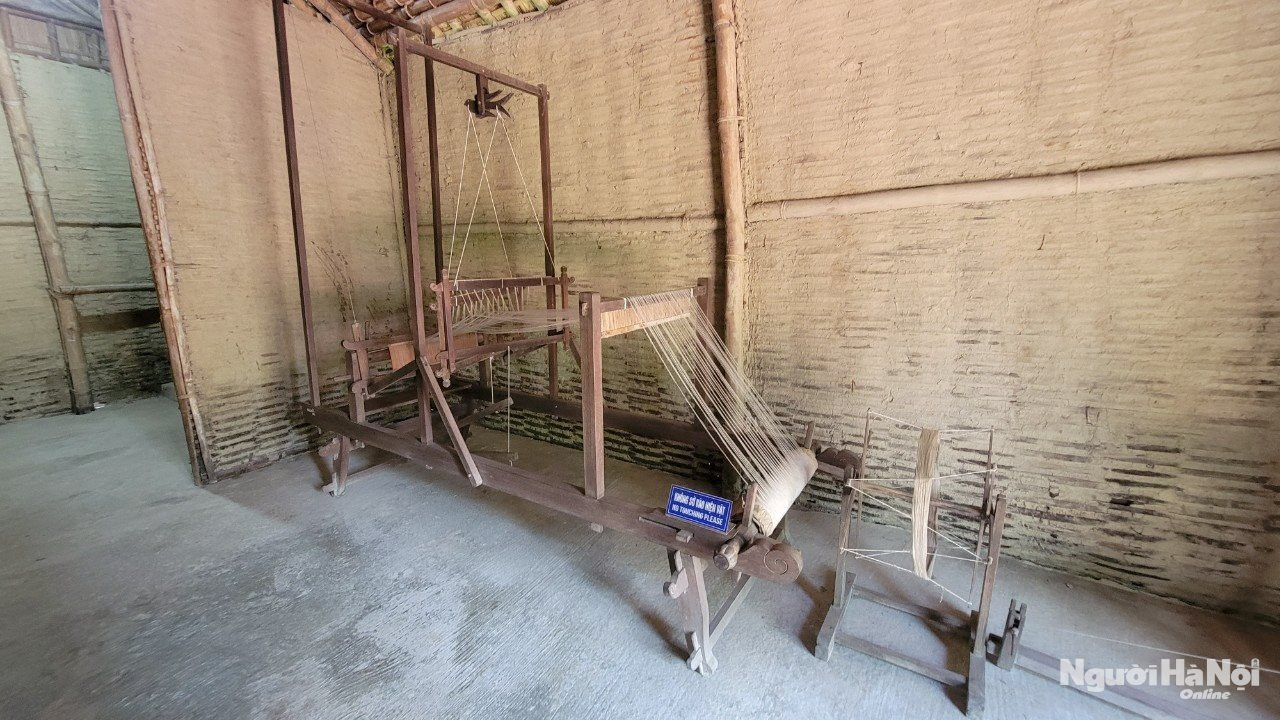
In the capital city of Hue, while Mr. Sac was away, Mrs. Loan gave birth to her fourth child (little Xin) and became seriously ill. She was in terrible pain, feeling like she might die. When would her husband and children return? Thinking of her old mother in the countryside who was waiting with weary eyes, her heart ached even more. She gazed at her poor newborn baby and little Cung... then gradually fainted in immense pain. Seeing his mother unconscious, the baby crying for milk, Cung hurriedly ran to call for help from relatives and aunts to treat his mother.
Moved with compassion, many people wholeheartedly helped Mrs. Loan and her children. Local doctors came to visit her and tried their best to cure her. But Mrs. Hoang Thi Loan's kind heart stopped beating at noon on December 22, Canh Ty year (February 10, 1901).
The townspeople prepared a coffin and carefully buried Mrs. Loan. At that time, the royal court's laws were very strict, prohibiting many things, including the prohibition of crying when sad events happened, and the prohibition of bringing the dead to the city gates. Anyone who violated these laws would be imprisoned or beheaded. Therefore, Mrs. Loan's body had to be taken through Thanh Long gate, out of the inner city, put on a boat across the Huong River, and buried at the foot of Ba Tang mountain (in the Ngu Binh mountain range).
There was only one week left until Tet. While the children in the neighborhood were excitedly going to Dong Ba Tet market, Cung carried his younger brother to beg for milk! There were nights when little Xin was so thirsty for milk that he cried loudly, making his older brother cry too! It was hard to describe Cung's boundless grief after his mother passed away.
While in the Viet Bac resistance base in 1948, one day, while sitting at the typewriter, hearing a child crying, Uncle Ho stopped and called the security guard: "Come over and see why the child is crying. When I was a child, I also had a younger brother who often cried loudly like that"./.

